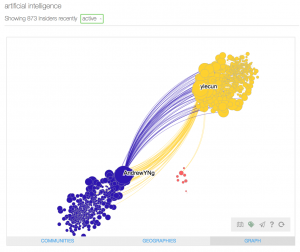I noticed last week that there was no Wikipedia entry for Blogher, the women-centric blogging conference, blog aggregator and now VC funded company.  Shocked, I twittered that this was the case and my buddy Jeremy Pepper replied asking whether he should write an article. Â
This was the second time in a month someone has asked me a question about whether they should be the person to write an article in Wikipedia so I thought I’d share some of my thoughts here.  A Blogher article in particular makes an interesting case study.
Wikipedia has great Search Engine Optimization, can be a good traffic generator and is a good reference source.  People like to have an entry in Wikipedia for their projects for a variety of reasons.  In this case, there ought to be a Wikipedia page about Blogher just so that people can go to this widely trusted source to learn about the project. Who should start writing that page, though?
In general – here are a few things I think are important when considering whether you ought to be the person to write about something in Wikipedia.
1. Conflicts of interest: If you have an antagonistic relationship with something, you probably ought not write about it.  If you have a financial interest in that subject’s success, I am of the belief that it may be ok for you to write about it so long as you practice…
2. Disclosure: Make sure your user page identifies who you are and what you do for a living.  Being open makes a world of difference.
3. Value add: In addition to a neutral point of view, make sure your post adds important value to the Wikipedia community by being truly informative.  Also, the more you have contributed to Wikipedia in general the more any specific contribution will be respected. Â
4. Time invested: In some cases, like if a PR agent is writing about their client, I would recommend that in addition to disclosing the fact that you are a PR agent on your user profile page, you should also consider editing the article live in Wikipedia.  Multiple edits over time, even if from the same user, demonstrate time spent on the article in Wikipedia and help demonstrate respect for the platform.
To answer Jeremy’s question about Blogher I first searched in Technorati for his name and the word Blogher, to see what his relationship with the group was like.  He had written some supportive blog posts about the event, which received favorable comments from some people I understand to be leaders in the Blogher community.  I know that Blogher is generally supportive of participation by men.  I also did a google search for this query: site:http://blogher.org “for wikipedia.”  I found one forum thread about the fact that there is no Wikipedia article for Blogher.  The conversation seemed supportive of the idea, people were just wondering who should write it and how it should be done.  The thread seemed to taper off without any clear answers for that question.  That lead me to believe that there wasn’t any clear reason why the Blogher community did not want an article about Blogher in Wikipedia.
I suggested that Jeremy write one up and post it while logged into a Wikipedia account that was clearly tied to him personally.  That way people could see who was responsible and contact him to discuss it if they wanted to. He hasn’t written that article yet, but that’s ok. Eventually someone will write it and I think this is a good opportunity to talk about these questions.
If he does write this article, here’s how I suggest this and other articles begin.  In addition to maintaining a “neutral point of view” and sticking to the facts, it’s important that an article be long enough to satisfy the community of Wikipedians who dislike very short articles.  I’ve had articles be deleted because they weren’t substantive enough.
Since Blogher is an active online community there’s an opportunity to make sure that participants there know that a new Wikipedia entry about them has been posted.  Emailing them or posting to the Blogher forum could be good ways to let them know. Once they know about the article, they will have a chance to edit it as they see fit and help watch in case this new article gets nominated for deletion, as does happen frequently.
Finally, I’d suggest that if you add a new entry to Wikipedia that you check back daily for the first week after posting it to see if any conversation about the article has been posted or if the article has been nominated for deletion.  You can subscribe to the RSS feed for your entry’s history, but there doesn’t appear to be any way to track by RSS whether your article has been nominated for deletion.
If it is nominated for deletion, there will be a discussion and vote.  In that case, you can let people know and provide the URL for the voting page so they can participate in the conversation and respond to any concerns that the Wikipedia community may have.
Those are some of my thoughts about writing articles on Wikipedia.  There’s no guarantee of success in Wikipedia, but if you make a good-faith effort to contribute value to the community (with any interests of your own weighing less heavily than the interests of the community) then odds are good.  You’ll learn more about online social media from the experience of engaging, so in most cases I say yes – write that article. Â
I’m going to email a link to this post over to one of my Wiki-loving buddies and see if we can flesh out answers to these questions all the more.

 Will 2009 be the big year for corporate transparency, for a global conversation – perhaps for bargain basement online marketing tactics instead of old-school huge commercial campaigns?
Will 2009 be the big year for corporate transparency, for a global conversation – perhaps for bargain basement online marketing tactics instead of old-school huge commercial campaigns? 